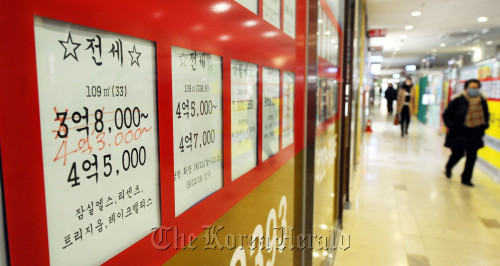The latest set of measures is particularly targeted at reducing the deposits for “jeonse,” a Korean rent system under which tenants pay a lump-sum deposit to rent a house for a certain term. Such a type of residence is common among mid- and lower-income households.
It is a more developed version of the set of measures the government unveiled on Jan. 13, the ministry said.
“The plan mostly concerns offering further tax cuts, interest rate cuts on loans and monetary subsidies for tenants to reduce their burden,” Land Minister Chung Jong-hwan said in a news briefing. “We are also pushing for an early supply of public housing and easing regulations.”

Under the latest price-stabilization measures, the government said it will lower interest rates on housing loans offered to low- and medium income people.
A household with an annual income of 30 million won ($26,800) or less and no record of home ownership can receive up to 80 million won in jeonse loans up from the current 60 million won.
Interest rate on the home loans will also be reduced from 4.5 percent to 4 percent, the ministry said.
The government said it also plans to provide tax benefits and financial support for home rental businesses to expand supply of homes to meet the high jeonse demand. The ministry is considering supplying about 127,000 small-sized housing units within the year, it said.
To this end, it will lower acquisition and transfer taxes for builders that purchase unsold apartments and lend them for jeonse residence. Investment on rental home business will also be eligible for tax benefits.
Experts say that the government was forced to come up with a more developed plan as its previous plan did not turn out to be as effective in reducing rental prices as expected.
Yet they still remain skeptical of the measures as most of them require modifying bills which later have to be approved by the National Assembly.
While the plan is likely to help boost home supplies, market watchers also expressed concern that the measures are not enough to stabilize the home market, saying that it has potential to lead to higher rent prices in the future.
Regarding the extension of the debt-to-income ratio suspension which expires in March, ministry officials said they would decide on the matter after a thorough review of the local property market.
Jeonse prices have been rising sharply over past a year, aggravating financial burden on the mid- and low-income brackets. Jeonse for apartments rose sharply at 8.8 percent in 2010, up from 4.5 percent in 2009 and 0.8 percent in 2008.
Mid- and small-sized apartments were the most popular with their jeonse rising 7.3 percent and 8.1 percent, respectively, compared to a 5.4 percent rise for large-sized apartments.
Region-wise, Gangnam, or southern Seoul, area was the most popular among tenants as the region is known for offering a favorable environment with many private institutions for students.
By Koh Young-aah (youngaah@heraldcorp.com)
<관련 기사>
<2·11 전세대책> 전셋값 잡고 매매 활성화 ‘두토끼 잡기’…약발은 의문
가구당 전세 8000만원까지
미분양 취득세 50% 감면
민간임대 활성화 유도
월세 보호방안 없어
알맹이 빠진 대책 지적도
정부의 ‘2ㆍ11 전세대책’은 주택 매매시장 활성화를 통해 국민적 관심사로 떠오른 전세난을 해소하겠다는 의지가 적극 반영됐다. 특히 매입 임대사업자에 대한 세제 지원과 준공 후 미분양 물량을 전ㆍ월세 주택으로 적극 활용할 수 있도록 한 내용은 주택 수요자를 매매시장으로 유입시키는 동시에 시장에 임대주택 공급물량을 늘릴 수 있는 것이어서 ‘전세난 해결’과 ‘주택거래 활성화’라는 두 마리 토끼를 잡을 묘안으로 평가받고 있다.
하지만 이를 실행에 옮기기 위해서는 각종 법령의 개정작업을 거쳐야 한다. 때문에 당장 발등의 불인 전세대란을 해소할 수 없다는 게 결정적 한계로 지적된다. 아울러 최근 급증하고 있는 반(半)전세, 월세 세입자에 대한 주거부담 완화 대책이 빠져 있는 점 역시 아쉬운 대목으로 지적된다.
▶ ‘전세난 해결’과 ‘주택거래 활성화’ 두 마리 토끼 잡는다=정부가 이번에 내놓은 보완대책의 핵심은 각종 세제지원을 통해 매매 수요를 민간임대주택 공급 시장으로 유도하겠다는 것으로 요약된다.
정부는 유형별ㆍ지역별로 상이한 매입 임대사업자 요건을 대폭 완화했다. 서울 기준 85㎡ 3억원 이하 주택 5채를 10년간 보유해야 양도세 중과 완화와 종합부동산세 비과세 혜택을 주던 것을 149㎡ 이하 3채 5년 이하로 요건을 대폭 완화했다. 수도권도 85㎡ 이하 3채 7년 보유를 149㎡ 이하 3채 5년으로 완화했다.
특히 세제혜택을 받기 위해서는 보유 주택이 동일 시ㆍ도에 있어야 했지만, 이번 대책에서는 수도권 내로 완화한 것이 부동산시장에 긍정적이다. 경기도 일산과 용인ㆍ남양주에서 각각 주택을 매수해 임대를 줘도 세제혜택을 받을 수 있게 된 것.
권주안 주택산업연구원 선임연구위원은 “민간임대사업의 확대 대책이 나오며 전세 공급 부족의 해결을 기대할 수 있다”며 “다만 세제지원뿐만 아니라 임대사업자에게 일정 수준 이상의 임대수익을 보장해줘야 사업자가 좀더 매입 임대에 적극적으로 움직일 것으로 보인다”고 분석했다.
이어 그동안 시장에서 줄기차게 요구해왔던 민간 미분양 주택을 전ㆍ월세용 주택으로 활용하는 방안도 수용됐다. 정부는 이번 대책에서 건설사가 2년 이상 임대한 준공 후 미분양 주택을 취득하거나, 준공 후 미분양 주택을 취득해 5년 이상 임대하는 경우 취득세를 최대 50% 감면하고, 취득 후 5년간 발생한 양도소득에 대해 양도세를 50% 감면키로 했다. 이는 현재 빈집으로 남아 있는 주택을 임대주택 공급물량으로 전환하는 것이어서 실질적인 공급 확대 효과를 기대할 수 있다.
허윤경 건설산업연구위원은 “현재 전세난은 중소형에 집중된 탓이 큰데 중대형 물량이 시장에 나와주면 중소형 전세 수요가 어느 정도 옮겨갈 수도 있을 것으로 보인다”고 말했다. 다만 준공 후 미분양 물량이 대부분 수도권 외곽이어서 효과가 반감되는 요인으로 지적된다.
▶장기 시장 안정 초점, 봄철 전세난 해결은 역부족=전문가들은 이번 대책이 장기적으로 전ㆍ월세 임대시장 안정에 기여할 것으로 평가하면서도 사회문제로까지 번진 당장의 봄철 전세난 해소에는 역부족이라고 지적한다. 무엇보다 정부가 내놓은 대책 상당 부분이 국회의 법개정 절차가 필요한 게 부담이다. 아울러 세입자 부담 완화를 위해 전세자금 지원한도와 금리를 낮췄지만 최근 급증하고 있는 월세 세입자 보호 방안이 빠진 점도 한계점으로 지적된다.
정부는 서민ㆍ근로자 전세자금을 가구당 6000만원에서 8000만원까지 늘리고 금리도 연 4.5%에서 4%로 낮추겠다고 했지만, 주택바우처제도 등 월세 세입자 보호방안은 제시되지 않았다.
함영진 부동산써브 실장은 “이번 대책은 상당히 공격적인 것으로 평가되지만, 법개정 시간 등을 고려할 때 당장 봄철의 전세난을 잠재우기에는 역부족”이라고 말했다. 아울러 매매시장 활성화의 키워드인 총부채상환비율(DTI) 규제 완화 연장 여부가 함께 제시되지 못한 점도 한계점으로 지적된다.


















![[Today’s K-pop] Treasure to publish magazine for debut anniversary](http://res.heraldm.com/phpwas/restmb_idxmake.php?idx=642&simg=/content/image/2024/07/26/20240726050551_0.jpg&u=)